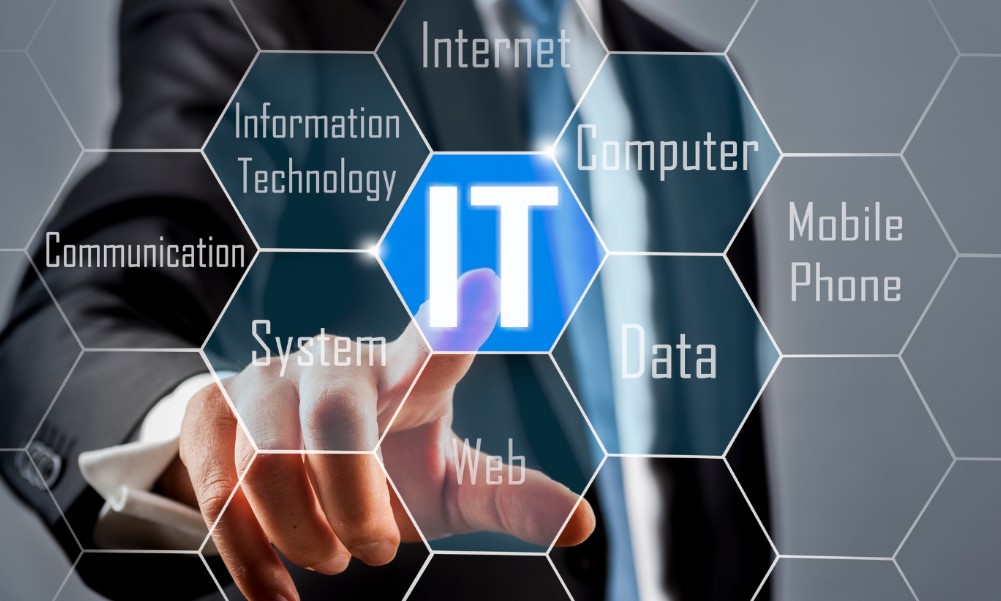The Ultimate Guide to Information Technology: Features, Solutions, and How to Choose the Right Tools
In an increasingly digital world, Information Technology (IT) plays a vital role in almost every industry. From healthcare to education, manufacturing to retail, IT solutions provide the backbone for modern business operations and personal productivity. IT encompasses various tools, software, and systems used to create, store, exchange, and use information efficiently.
Key Features of Information Technology

1. Automation
Automation is a cornerstone of Information Technology. IT systems streamline repetitive tasks, allowing businesses to save time and reduce errors. Automation tools include software like workflow management systems, AI-driven processes, and machine learning, which optimize operations by performing tasks without human intervention.
2. Data Storage and Management
Effective data management is one of the primary functions of IT. Cloud services and databases offer vast storage options, allowing organizations to securely store, retrieve, and process large amounts of data. Tools like SQL databases, cloud storage solutions, and data warehouses are widely used for this purpose.
3. Connectivity and Communication
IT enables seamless communication through networking technologies, such as email, VoIP, and video conferencing tools. Platforms like Cisco Webex, Zoom, and Microsoft Teams help teams collaborate remotely, ensuring smooth communication regardless of location.
4. Security
Cybersecurity is an essential feature of IT, protecting data from unauthorized access, breaches, and cyberattacks. Encryption, firewalls, antivirus software, and multi-factor authentication are all crucial for safeguarding sensitive information.
5. Scalability
Scalability allows IT systems to grow alongside business needs. Cloud computing services like AWS and Microsoft Azure enable companies to scale their resources up or down without investing in physical hardware, making them cost-effective and flexible solutions.
The Benefits of Information Technology

Information Technology provides numerous benefits to individuals, businesses, and organizations alike. Whether you’re a small business looking to grow or an individual needing to organize your personal digital life, IT products have something to offer. Let’s explore some of the key benefits:
1. Increased Efficiency
IT solutions allow businesses and individuals to streamline their processes. With tools such as cloud-based storage, automated workflows, and real-time communication systems, users can complete tasks faster and more accurately. This increased efficiency leads to significant cost savings as well. For instance, businesses no longer need to invest in physical infrastructure when cloud computing offers scalable and flexible alternatives.
2. Automation of Repetitive Tasks
One of the biggest advantages of IT is automation. Automation tools, such as workflow management software and artificial intelligence (AI)-powered solutions, help businesses eliminate repetitive, mundane tasks. This allows employees to focus on more strategic and creative work, ultimately leading to better business outcomes.
3. Real-time Data Management and Analytics
Modern IT systems allow businesses to collect, store, and analyze data in real time. Data is a critical asset in today’s business landscape. With IT products such as cloud services and data analytics platforms, businesses can make informed decisions based on the most recent data.
4. Enhanced Communication and Collaboration
IT tools, especially collaboration platforms, enable real-time communication between teams, partners, and clients across the globe. Video conferencing, cloud-based document sharing, and project management tools make it easier for remote teams to work together effectively, no matter their physical location.
5. Security and Compliance
Cybersecurity is a significant concern for both businesses and individuals. IT solutions offer various layers of protection, from encryption to firewalls and data access controls. Many platforms comply with industry regulations, ensuring that businesses adhere to legal requirements while maintaining data security.
Top 5 Information Technology Products

Now, let’s dive into five of the most widely used IT products, explaining their features, use cases, pricing models, and where you can buy them. Each product plays a different role in the IT ecosystem, serving unique business or personal needs.
1. Microsoft Azure
Microsoft Azure is a comprehensive cloud computing platform designed for businesses of all sizes. Azure offers a wide array of services, including virtual machines, databases, AI, and machine learning integration. Azure’s scalable nature makes it ideal for businesses looking to grow their infrastructure without investing in costly hardware.
- Key Features:
- Virtual machines and cloud storage
- AI and machine learning tools
- Integration with Microsoft’s ecosystem
- Enterprise-level security and compliance
- Use Case: Microsoft Azure is ideal for businesses that want to transition to a cloud-first approach, utilizing virtual servers, databases, and other services to scale their operations. It is particularly useful for organizations that rely on Microsoft products, as Azure integrates seamlessly with tools like Office 365 and Dynamics.
- Price: Microsoft Azure operates on a pay-as-you-go model, with prices starting at $15 per month for basic services such as cloud storage and virtual machines. Advanced features like AI and machine learning can incur additional costs.
- Where to Buy: You can explore Microsoft Azure services and sign up at the official Microsoft Azure website.
2. Amazon Web Services (AWS)
Amazon Web Services (AWS) is one of the most popular cloud computing platforms, providing over 200 fully-featured services such as compute power, storage, and networking. AWS offers unparalleled flexibility, allowing businesses to deploy a wide range of applications quickly and efficiently.
- Key Features:
- Serverless computing and virtual servers
- Global cloud infrastructure
- Extensive AI and machine learning tools
- Flexible pricing models
- Use Case: AWS is ideal for businesses of all sizes, offering solutions that range from simple website hosting to complex data analytics. Startups, large enterprises, and even government organizations use AWS to scale their digital operations efficiently.
- Price: AWS follows a pay-as-you-go pricing model, meaning businesses only pay for the services they use. There is also a free tier available for new users, offering basic features to help you get started without upfront costs.
- Where to Buy: You can purchase AWS services and view their pricing options directly from the Amazon Web Services website.
3. Google Workspace
Google Workspace (formerly known as G Suite) provides cloud-based productivity tools such as Gmail, Google Drive, Google Docs, and Google Meet. These tools are designed to enhance collaboration and productivity within teams, particularly for businesses and educational institutions.
- Key Features:
- Real-time collaboration on documents and spreadsheets
- Cloud storage for emails and files
- Seamless integration with third-party apps
- Secure file-sharing and access controls
- Use Case: Google Workspace is perfect for businesses and educational institutions that prioritize collaboration. It allows teams to work on documents in real time, hold video meetings, and share files securely. It is also highly scalable, catering to both small businesses and large enterprises.
- Price: Google Workspace pricing starts at $6 per user per month for the basic plan, which includes access to Gmail, Google Docs, Drive, and more.
- Where to Buy: You can purchase Google Workspace subscriptions from the official Google Workspace website.
4. Cisco Webex
Cisco Webex is a leading video conferencing and collaboration solution. It provides high-quality video and audio meetings with additional tools such as document sharing and meeting recording. Webex is widely used in corporate environments, educational institutions, and for remote team collaboration.
- Key Features:
- High-definition video and audio conferencing
- Cloud storage for meeting recordings
- Integration with calendar and scheduling tools
- Strong security and encryption features
- Use Case: Cisco Webex is best suited for businesses and educational institutions that require robust video conferencing and collaboration tools. It is also useful for remote teams that need to maintain seamless communication and documentation.
- Price: Cisco Webex pricing starts at $13.50 per user per month, with different plans offering varying levels of features such as cloud storage and premium security.
- Where to Buy: You can purchase Cisco Webex plans directly from the Cisco Webex website.
5. IBM Cloud
IBM Cloud is an enterprise-grade cloud computing platform designed for large-scale businesses with critical data and infrastructure needs. IBM Cloud offers a combination of public, private, and hybrid cloud solutions, with added features for data analytics and artificial intelligence (AI).
- Key Features:
- Secure, scalable cloud services
- AI-driven data analytics tools
- Hybrid cloud support for enterprises
- Industry-leading security compliance
- Use Case: IBM Cloud is most suitable for large enterprises and organizations that need to manage large amounts of data in a secure environment. It’s an ideal platform for industries like healthcare, finance, and government agencies where data security and compliance are paramount.
- Price: IBM Cloud offers a wide range of pricing plans, with virtual server costs starting at $0.046 per hour. Custom pricing is also available for enterprises with large-scale requirements.
- Where to Buy: You can explore IBM Cloud offerings and sign up at the official IBM Cloud website.
Product Comparison Table
| Product | Best Use Case | Advantages | Disadvantages | Price | Key Features |
|---|---|---|---|---|---|
| Microsoft Azure | Cloud computing for growing businesses | Scalable, secure, integrates with Microsoft | Steep learning curve for beginners | From $15/month | AI, cloud storage, virtual machines, enterprise security |
| Amazon Web Services (AWS) | Cloud solutions for all sizes | Flexible, extensive service offerings | Complex billing structure | Pay-as-you-go | Global infrastructure, AI, serverless computing |
| Google Workspace | Team collaboration and productivity | User-friendly, real-time collaboration | Limited advanced customization | From $6/user/month | Cloud storage, document sharing, real-time collaboration |
| Cisco Webex | High-quality video conferencing | Secure, high-definition video and audio | Premium plans can be costly | From $13.50/user/month | Video conferencing, cloud recording, calendar integration |
| IBM Cloud | Enterprise-level cloud computing | AI-driven analytics, high security | Higher pricing for enterprise plans | From $0.046/hour | Hybrid cloud, AI integration, enterprise security |
Detailed Transactional Information: Where and How to Buy IT Products
1. Microsoft Azure
- Where to Buy: Available on the Microsoft Azure website.
- How to Buy: Simply sign up for a Microsoft account, choose the plan based on your needs, and get started with virtual machines, cloud storage, or advanced AI tools.
- Price: Basic services start at $15/month. Higher-tier plans include more advanced features at additional costs.
2. Amazon Web Services (AWS)
- Where to Buy: Purchase AWS services from the AWS website.
- How to Buy: AWS offers a flexible pricing model. Create an AWS account, explore the pay-as-you-go options, and select the services you need.
- Price: Prices vary based on usage. New users can benefit from the free tier for 12 months.
3. Google Workspace
- Where to Buy: Available for purchase through the Google Workspace website.
- How to Buy: Sign up for a free trial or choose a pricing plan based on the number of users in your team.
- Price: Starting at $6/user/month, with advanced features available in higher-tier plans.
4. Cisco Webex
- Where to Buy: Cisco Webex services are available on the Webex website.
- How to Buy: Browse through the available plans, sign up for the one that fits your needs, and begin hosting high-quality video meetings.
- Price: Starting at $13.50/user/month.
5. IBM Cloud
- Where to Buy: You can explore IBM Cloud and sign up on the IBM Cloud website.
- How to Buy: IBM Cloud offers both pay-as-you-go and subscription-based models. Sign up and choose the plan that fits your enterprise needs.
- Price: Virtual servers start at $0.046/hour, with customized pricing for larger operations.
Use Cases and Problems These Products Solve
Each IT product mentioned solves distinct challenges across industries:
- Microsoft Azure: Helps businesses scale without investing in physical infrastructure. Perfect for companies that need flexibility and growth in a cloud-first environment.
- AWS: Offers a range of services, from basic cloud storage to advanced AI tools, making it suitable for startups and enterprises alike.
- Google Workspace: Enables seamless collaboration for teams, whether remote or in-house. Ideal for businesses that rely on real-time communication.
- Cisco Webex: Provides robust solutions for teams that need reliable video conferencing, whether for internal communication or client meetings.
- IBM Cloud: Offers enterprise-level security and data protection, crucial for businesses handling sensitive information, such as healthcare providers and financial institutions.
FAQs
1. What is cloud computing, and why is it important?
Cloud computing allows businesses to use computing resources like servers, storage, and databases over the internet. It eliminates the need for physical infrastructure and reduces costs.
2. What are the benefits of using AWS?
AWS provides scalable, flexible cloud solutions that can grow with your business. It offers a wide range of services, including AI, machine learning, and storage.
3. Is Google Workspace secure for businesses?
Yes, Google Workspace is highly secure and includes advanced encryption, data protection, and access controls to safeguard sensitive business data.
4. What are the pricing options for Microsoft Azure?
Azure offers a pay-as-you-go model, starting at $15/month for basic services. Costs increase as you add more advanced features like AI or database management.
5. Which IT solution is best for remote teams?
Cisco Webex and Google Workspace are excellent options for remote teams due to their robust collaboration tools, including video conferencing and real-time document sharing.